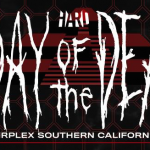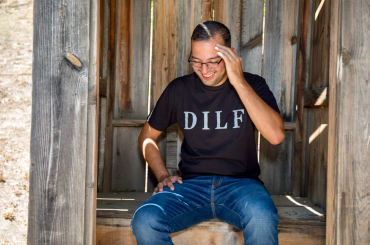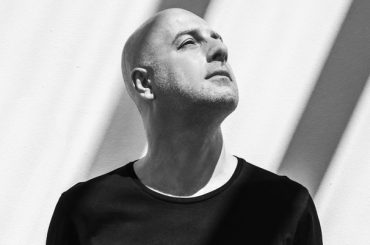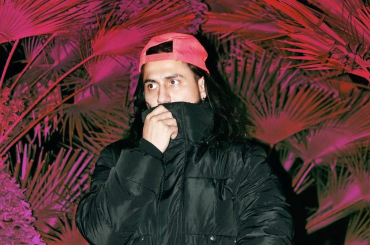“I Think
Every DJ
Has His
Own Way Of
Doing His
Thing And
You Have
To Respect
That. If You
Don’t, You
Just Don’t
Need To Go.”
DJ Times: You are used to doing around 250 gigs a year. How do you even find time to create an album amongst such a hectic touring schedule?
Aoki: It’s partially the reason why it took me over two years to do this album. I wrote a bulk of Neon Future I in the beginning of 2013 when I took off some shows and actually focused on that. Then I just powered through shows, and in the open pockets is when I was like, “OK, now I have studio time to work with Fall Out Boy, here’s some studio time to work with Luke Steele, and here’s some studio time to work with whomever else.” In 2014, I took a major show reduction from what I think was close to 300 to 220 for more time to finish the album. If you have an end date that you’re shooting for, it can little bit difficult because if you are putting everything around that date, it might not happen. That’s what happened last year with Neon Future I. I had everything lined up to come out in August, and then the album got pushed back and it was a huge issue for me because I had so much stuff riding on that month.
DJ Times: How do you adjust the plan accordingly from something like that? Do pieces have to get left behind?
Steve Aoki: It’s case-by-case. With that album, it was one major song that was a really big piece of the story, so I had to wait and sacrifice some other really important things that were riding on the album. With Neon Future II, a lot was done, although there are a few songs I added to the album that I started and finished when I was finishing up. The summer of 2014 was when I started working with Walk Off The Earth and Moxie and also made serious changes to Linkin Park and Snoop Lion’s tracks. Those two songs made radical changes from what they originally were. The Linkin Park track has an interesting production tale for myself. Generally, if you ask any producer, they want to produce a song and then release right when they are done with it because they’re basing their song off cultural cues and what’s the sound of now. You start to get inspired by what you are hearing, and things change so fast obviously. Look at the Beatport Top 10 or things like that. If you gauge it off those things, you need to get your record out sooner or else you’re going to be dated.
DJ Times: One day you’ll have a tech-house track on top of Beatport, and the next day you’ll have an electro-house song.
Aoki: Yeah. With the Linkin Park song, I had the complete opposite way of looking at producing a song. I wanted to start fresh with a very clean, neutral slate.
DJ Times: Like producing in a vacuum?
Aoki: Exactly. That song went through a lot of changes and a lot of it got stripped out and then relayed with new dimensions, color, and attitude to add to the emotional intensity of the record. Linkin Park brings on a lot more than just a singer; they have so many more elements to work with. It was two and a half years in progress, and—if I really go back—I started writing that the same time we did “The Light That Never Comes.” So the inspiration behind “Darker Than Blood” stems from ideas in 2012. If you can sit with the record that long and it’s still fresh and current, then hopefully it’ll be current for a long time.
DJ Times: You’ve cited Coachella 2009 as when you first “brought entertainment” to your DJ sets via a live-production element. Those production elements have gotten bigger over time. It’s not just a raft or a cake; it’s a robot on stage. How much can be planned beforehand and how much comes about spur of the moment when you’re playing?
Steve Aoki: Obviously, when you feel the crowd you can control where the set is going to go musically; all these other things have to kind of go around how you prep your narrative of your show. For the Neon Future Experience, we have a set guideline of songs I’m playing; I’m playing all Neon Future I & II and then the big older hits that people love like “Boneless” and “Turbulence.” But like five minutes before I’m still going, “Change this to this and this to this,” because I’m looking at the crowd and getting a vibe. Everyone is on radio and has a general guideline, so I may be tell everyone, “The robots are not going to go on this song; they’re going to go on this song.” There are a lot of moving parts, so everyone’s on their tippy-toes as far as figuring out what’s going to happen. Things are going to change last-minute, but for the most part they know the general track list that I’m going to play, if I’m going to introduce something new—like if I make a new edit because the one I did is not working—I’ve got to tell everyone. I need everyone to hear and understand the song and where it’s going to go and how I’m going to mix it. Things like that.
DJ Times: Do you think that with the advent of digital DJing that DJs have a responsibility to bring more to the live experience than just picking tracks and playing records?
Steve Aoki: It depends. Every DJ has his own way of playing music and sometimes you don’t want that big show. In Ibiza when you go to a beach party, it’s not like you want to look at the DJ. I went to one and I knew Jamie Jones was playing, but it’s not like you need to see where he’s at; he’s playing the fucking sickest shit. It’s very traditional in the sense that he is just in the corner playing records, but when you see it, it’s awesome. The purest, truest form of DJing is playing records of a particular sound—that has its own culture. That’s a beautiful thing and—at the base of it—that’s why we’re there. We are not there to see a big spectacle. We’re there to be a part of a particular sound that is coming from this culture that you like because of how it makes you feel or the kind of people that are there or whatever it might be. Once again, when you hear music it’s not in a vacuum and it very much has a cultural adherence. You go and you want to be part of that culture.
DJ Times: Of course.
Steve Aoki: I went with Skrillex to go see [Jamie Jones] at Paradise at like 7 a.m., after my own set at Pacha. He was doing his thing and there was that vibe and all the love coming through. You see all the different parts of the culture and you feel it and it’s awesome. It’s a kind of thing where you are there and you can just be a part of it with the music. It’s not about the spectacle. I think every DJ has his own way of doing his thing and you have to respect that. If you don’t, you just don’t need to go.

DJ Times: The phrase I’ve seen used is “personality-driven DJing.” Do you think that’s an apt description of what you do?
Steve Aoki: I think people are going to classify however way they are going to classify things; that’s what everyone likes to do. The sole root of why we’re there, though, is to feel music in one form or fashion. Some people go to a Steve Aoki show, and they have this adrenaline rush of energy because that is my intention. My intention is to create an intense energy and feeling, so if I’m doing it then it’s working. I want to give a full-on sensory overload of music, feeling, and energy It’s hard for me to say, “Yes, I am doing a personality thing” or whatever, but you go for different reasons.
DJ Times: Does it compares to other event experiences?
Aoki: When I go to see Richie Hawtin’s ENTER.Ibiza at Space, I’m going to experience what he’s curated. It’s incredible to go to something like that because it’s not like you just hear minimal techno; you hear all kinds of different sounds because he curated every single room. It’s an incredible feat to create an experience like that, so I looked towards that kind of inspiration. I love that he’s able to encompass all these different sounds and these different subcultures inside this one universe of what he’s doing. So when I think about personalities and stuff, I guess you can classify like that. But once again, people are going to go to experience things based on how they feel about it. Some people don’t want to go crazy; they want to just groove and chill and have a long time experiencing some things and some people just want to have a high-impact. It’s like CrossFit versus doing the marathon.
DJ Times: How do you adjust your set for different crowds? How might you approach or prepare differently for say the Ultra main stage versus a show at Hammerstein Ballroom or Hakkasan?
Aoki: I’m thinking about the audience. So when I’m looking at playing Ultra to all kinds of people on the main stage, I’m not here to crowd please so much as to kind of inform and share something that I created and means a lot to me. Recently, in the case of Neon Future, I’m here to introduce it. That’s why if you go through the track listing of that show, it’s pretty much like a Neon Future Experience set, but it’s more compact because I only have an hour. I’m taking the best of a Steve Aoki show; that’s more like the book of the movie and [the Ultra set] is like the movie.
DJ Times: What about club shows?
Steve Aoki: For Hakkasan and other club shows, I’m still giving that kind of experience, but I’m being more experimental because it’s a club and I have more freedom and flexibility. In smaller rooms, it depends; the smaller it gets, the more experimental I’m able to play. It’s not about this full-blown showcase of an idea. In Europe, I think also an interesting point to make is that it’s going to be a different of way to share per country. As ambassador of Neon Future, you can’t speak Spanish to English people or Korean to Japanese people, so you have to want to come across to people in the way they understand it the best. You have to do the best job you can to interpret how they can understand that. For example, in America I can play more vocal records, whereas I won’t do that in some parts of Europe. I’ll play more of the instrumental where it’s not about what these lyrics mean to people, but what the music means.
DJ Times: You founded Dim Mak Records in 1996. It’s become such an important music label and force within the music industry. Did you expect any of this when you were first starting it?
Aoki: When I first started it almost 20 years ago, it was not considered a business because at the time everything I was doing that was related to music. It didn’t feel right if it was a business because it was always about… how much could I give back to the community that I was very prideful of? When we did shows in the living room, we never took a dollar; we gave all the money to the artists. When I started the label, I had all these bands coming through and so many demos to listen to from these amazing artists. I needed to help develop bands, so I teamed up with some friends and we just pulled in some money for the first seven-inch. Now 19 years later, we have a full staff of 15 people working hard and bleeding Dim Mak music out their veins. It’s incredible to see where it’s gone from there to now.
DJ Times: Over the years, Dim Mak has released records across all genres and styles. What do you think ties all of those releases together?
Steve Aoki: I think that how we survived through nearly two decades is from not being confined to one particular genre. I’ve seen genres come and go and sometimes they are so incredibly strong that you don’t think they’ll ever go away and then they go. People’s culture just shifts and changes and transforms and evolves and nothing is ever fixed, so you have to remain fluid and flexible. It’s not like I came into this with the idea to do that; it’s just for the fact that I love all kinds of music. When I was putting out The Kills I was still a hardcore junkie, I loved all those old hardcore bands, but I just also love rock-n-roll and I also loved indie rock. To me, sometimes it’s not necessarily about a song that speaks to me; it’s just about something is so unique and ingenious; an attempt that makes it completely unique and different that draws me to a band or draws me to an artist or producer. I think that story also follows the reason why I signed the Bloody Beetroots. It wasn’t one particular remix that I heard; it was just a sound they were creating at the time that they were creating it.



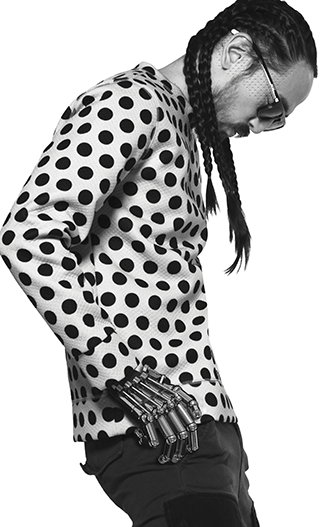 “I Think
“I Think